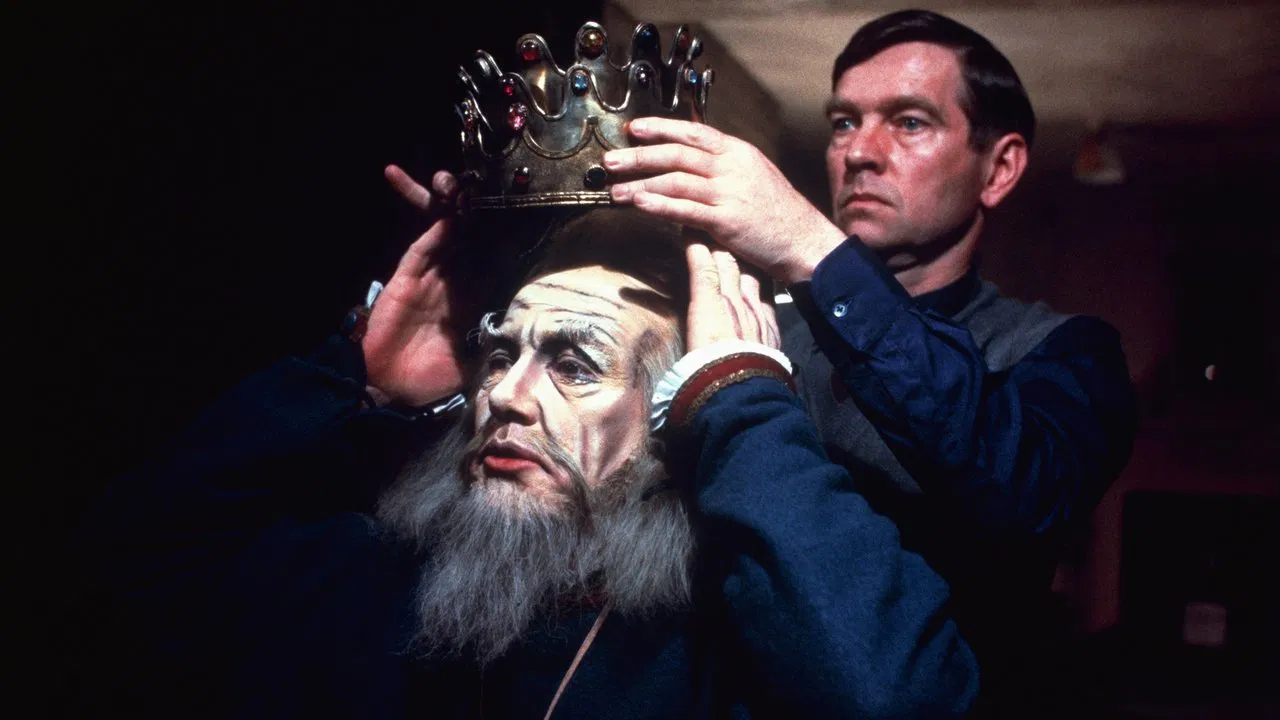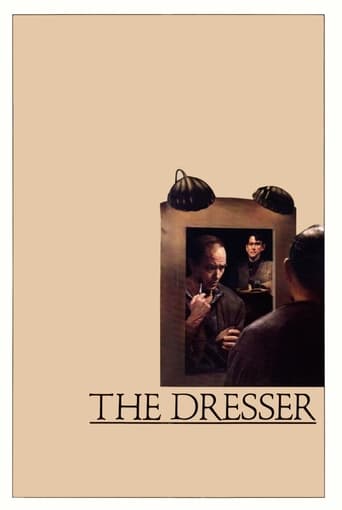

It's WWII Britain in the midst of the Blitz. Sir (Albert Finney) is bombastic tyrannical head of a Shakespearean theater group. They are a touring group performing King Lear. Norman (Tom Courtenay) is his long-suffering effeminate assistant, the dresser. Sir shows deteriorating mental abilities and Norman struggles to help him.I really don't like any of the characters. The world is burning and all they care about is their play. It starts off annoyingly with Sir halting a train in the middle of the war. There are ways to make it funny and likable. I rather wish they miss the train and Sir blows up on Norman. Norman is an enabler and is not likable either. I don't like Courtenay's stereotypical gay acting but one must keep the era in mind. Albert Finney is great in the role but I really don't like these people and their stupid little problems in the grand scheme of things.
... View Moreone of great roles of Tom Courtenay. and a splendid performance of Albert Finney. a film about Shakespeare, theater, sacrifice, need of the other and circle of life. touching. and powerful. a play who, in this adaptation, seems be a kind of parable. because not only the acting is brilliant but the atmosphere soul. a world. like an iceberg. and nuances of sacrifice as only reality. a good film. and little more. because it has the rare gift not only impress but reflect hided places of each life. the actor. and the dresser. and a subtle touching fight. against yourself and against the other. that is all. so, it is not a bad idea to see it ! not only as old movie. but as a rare gem about the things who are really important.
... View More"Sir" has played Lear over 200 times,but tonight he can't remember his opening lines.Sitting at the mirror,his eyes reflect the King's madness. His dresser prompts him gently,mouthing the words.There is an air of desperation about both these men.The great actor knowing his powers are slipping away,his valet cum major domo cum conscience cum surrogate wife - aware of his boss's decline into madness and knowing he is powerless to do more than ease his passing. "The Dresser" is really a love story between the two.Over the years they have become mutually dependent on one another to the extent that neither can conceive a future without the other. Set during the second world war,it concerns the fortunes of a frankly second - rate touring Shakespearean Company comprising an equal number of has - beens and wannabes led by "Sir", a theatrical knight of what might kindly be called "The Old School".Whatever part he is playing he grabs centre - stage and bellows out over the footlights,bullying his audience into applause.But,somewhere inside him,buried most of the time deep beneath the ham he regularly dishes out,there still remains an occasional glitter of his earlier greatness.It is to catch a glimpse of this that his audiences fervently hope for. Mr A.Finney very cleverly concentrates on the ham,often to the point of caricature,and,just when you are ready to dismiss his performance as mere hyperbole and bluster he will produce a moment of exquisite subtlety and vulnerability that makes you realise that a great actor is playing a great actor. The same goes for Mr T.Courtenay.It's easy to write off his portrayalof Norman as an exercise in stereotyping.Here we have a middle - aged effeminate rather than camp theatrical dresser sashaying his way through life,enjoying the company of "The Girls" and loving the wicked Insider gossip rife in "The Theatre".There were - and I strongly suspect still are - many men just like Norman in The Profession.Infinitely kind and patient,knowing more about the plays than many of the actors,they run backstage with wisdom and affection.I believe the vast majority of them would hoot with approving laughter at Mr Courtenay's portrait. I saw "The Dresser" on the London stage where,against the perceived wisdom,Mr Courtenay's "Norman" was rather more subdued than in the movie."Sir" was played by the great Mr Freddie Jones to huge acclaim from the audience.It was a memorable performance that overshadowed Mr Courtenay's,reducing him rather to an "also - ran" as opposed to an actor on level - billing.The idea that "Sir" and "Norman" might be almost incomplete without each other went right out of the window. "Norman" was reduced to being his puppet,which I'm not sure was what Ronald Harwood intended,but made for breathtaking theatre. Messrs Finney and Courtenay redress the balance in the movie,restoring equality to the relationship. Both men have come a long way since their early appearances in the British "New Wave" pictures when they became the darlings of the vaguely Leftish,"middle - class and ashamed of it" movement.When the British cinema virtually committed Hari - kiri in the 1970s they quietly concentrated on the theatre apart from a few roles to keep the wolf from the door.With the renaissance of more substantial movies,they re - appeared,blinking in the unaccustomed bright light."The Dresser" marked their return,still fizzing with energy and talent, shouting to the world at large "We're still here".It's not a big movie but is assuredly a great one.
... View MoreThis is a movie that deserves another look--if you haven't seen it for a while, or a first look--if you were too young when it came out (1983). Based on a play by the same name, it is the story of an older actor who heads a touring Shakespearean repertory company in England during World War II. It deals with his stress of trying to perform a Shakespeare each night while facing problems such as bombed theaters and a company made up of older or physically handicapped actors--the young, able bodied ones being taken for military service. It also deals with his relationship with various members of his company, especially with his dresser. So far it all sounds rather dull but nothing could be further from the truth. While tragic overall, the story is told with a lot of humor and emotions run high throughout. The two male leads both received Oscar nominations for best actor and deservedly so. I strongly recommend this movie to anyone who enjoys human drama, theater--especially Shakespeare, or who has ever worked backstage in any capacity. The backstage goings-on make up another facet of the movie that will be fascinating to most viewers.
... View More